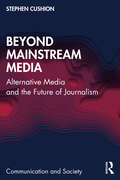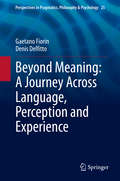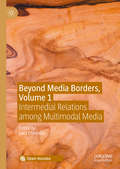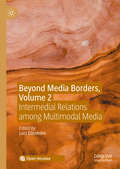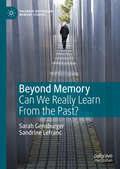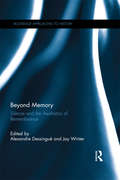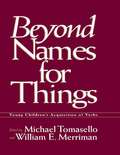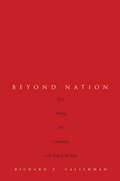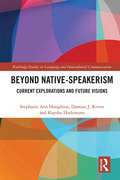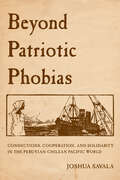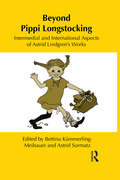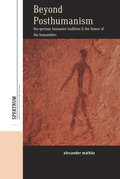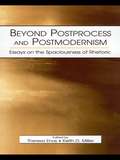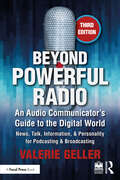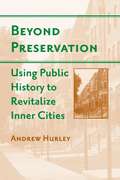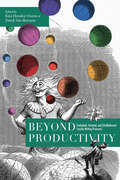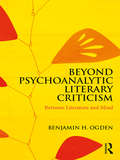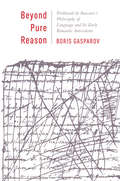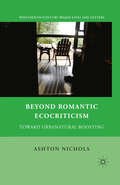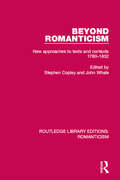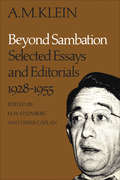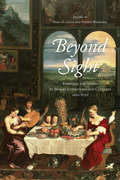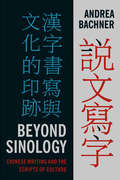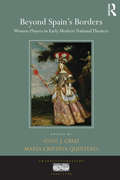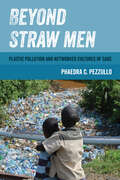- Table View
- List View
Beyond Mainstream Media: Alternative Media and the Future of Journalism (Communication and Society)
by Stephen CushionOffering one of the most comprehensive assessments of alternative media to date, Beyond Mainstream Media examines the rise of alternative media over the last decade, analysing their changing content and editorial strategies, and exploring why many people go beyond the mainstream media for news and information. Considering the differences in agenda between alternative and mainstream media coverage, Cushion sheds light on why right-wing alternative media have become a more prominent part of national media systems than left-wing sites in the Western World. In doing so, he argues that alternative left-wing media should place less emphasis on attacking professional journalism and focus more on converging into the world of mainstream news to promote their politics. This book draws on over 3,500 articles and 17,000 social media posts produced by alternative media, extensive interviews with editors and contributors, and a survey of over 2,700 media users. It develops a comparative international perspective by explaining how findings and concepts can be applied to understanding much broader issues, such as public distrust in the mainstream media or the influence different media and political systems have on the production of alternative media. Providing both an introduction to and a critical analysis of the state of alternative media today, this book is written in clear, jargon-free language and is recommended reading for advanced students undertaking courses in Alternative Media and Political Journalism.
Beyond Meaning: A Journey Across Language, Perception and Experience (Perspectives in Pragmatics, Philosophy & Psychology #25)
by Gaetano Fiorin Denis DelfittoNatural languages – idioms such as English and Cantonese, Zulu and Amharic, Basque and Nicaraguan Sign Language – allow their speakers to convey meaning and transmit meaning to one another. But what is meaning exactly? What is this thing that words convey and speakers communicate? Few questions are as elusive as this. Yet, few features are as essential to who we are and what we do as human beings as the capacity to convey meaning through language. In this book, Gaetano Fiorin and Denis Delfitto disclose a notion of linguistic meaning that is structured around three distinct, yet interconnected dimensions: a linguistic dimension, relating meaning to the linguistic forms that convey it; a material dimension, relating meaning to the material and social conditions of its environment; and a psychological dimension, relating meaning to the cognitive lives of its users. By paying special attention to the puzzle surrounding first-person reference – the way speakers exploit language to refer to themselves – and by capitalizing on a number of recent findings in the cognitive sciences, Fiorin and Delfitto develop the original hypothesis that meaningful language shares the same underlying logical and metaphysical structure of sense perception, effectively acting as a system of classification and discrimination at the interface between cognitive agents and their ecologies.
Beyond Media Borders, Volume 1: Intermedial Relations among Multimodal Media
by Lars ElleströmThis open access book promotes the idea that all media types are multimodal and that comparing media types, through an intermedial lens, necessarily involves analysing these multimodal traits. The collection includes a series of interconnected articles that illustrate and clarify how the concepts developed in Elleström’s influential article The Modalities of Media: A Model for Understanding Intermedial Relations (Palgrave Macmillan, 2010) can be used for methodical investigation and interpretation of media traits and media interrelations. The authors work with a wide range of old and new media types that are traditionally investigated through limited, media-specific concepts. The publication is a significant contribution to interdisciplinary research, advancing the frontiers of conceptual as well as practical understanding of media interrelations. This is the first of two volumes. It contains Elleström’s revised article and six other contributions focusing especially on media integration: how media products and media types are combined and merged in various ways.
Beyond Media Borders, Volume 2: Intermedial Relations among Multimodal Media
by Lars ElleströmThis open access book promotes the idea that all media types are multimodal and that comparing media types, through an intermedial lens, necessarily involves analysing these multimodal traits. The collection includes a series of interconnected articles that illustrate and clarify how the concepts developed in Elleström’s influential article The Modalities of Media: A Model for Understanding Intermedial Relations (Palgrave Macmillan, 2010) can be used for methodical investigation and interpretation of media traits and media interrelations. The authors work with a wide range of old and new media types that are traditionally investigated through limited, media-specific concepts. The publication is a significant contribution to interdisciplinary research, advancing the frontiers of conceptual as well as practical understanding of media interrelations. This is the second of two volumes. It contains a concluding article by Elleström and seven contributions concentrated on the issue of media transformations: how media characteristics are transferred and transfigured among various media products and media types.
Beyond Memory: Can We Really Learn From the Past? (Palgrave Macmillan Memory Studies)
by Sarah Gensburger Sandrine LefrancThis book provides a fresh perspective on the familiar belief that memory policies are successful in building peaceful societies. Whether in a stable democracy or in the wake of a violent political conflict, this book argues that memory policies are unhelpful in preventing hate, genocide, and mass crimes. Since the 1990s, transmitting the memory of violent pasts has been utilised in attempts to foster tolerance and fight racism, hate and antisemitism. However, countries that invested in memory policies have overseen the rise of hate crimes and populisms instead of growing social cohesion. Breaking with the usual moralistic position, this book takes stock of this situation. Where do these memory policies come from? Whom do they serve? Can we make them more effective? In other words, can we really learn from the past? At a time when memory studies is blooming, this book questions the normative belief in the effects of memory.
Beyond Memory: Silence and the Aesthetics of Remembrance (Routledge Approaches to History)
by Alexandre Dessingué Jay M. WinterBeyond Memory: Silence and the Aesthetics of Remembrance analyses the intricate connections between silence, acts of remembrance and acts of forgetting, and relates the topic of silence to the international research field of Cultural Memory Studies. It engages with the most recent work in the field by viewing silence as a remedy to the traditionally binary approach to our understanding of remembering and forgetting. The international team of contributors examine case studies from colonialism, war, politics and slavery from across the globe, as well as drawing examples from literature, philosophy and sites of memory to draw three main conclusions. Firstly, that the relationship between remembering and forgetting is relational rather than ‘hermetic’, and the space between the two is often occupied by silence. Secondly, silence is a force in itself, capable of stimulating more or less remembrance. Finally, that silence is a necessary and key element in the interaction between the human mind and the ‘outer world’, and enables people to challenge their understanding of art, music, literature, history and memory. With an introduction by the editors discussing Memory Studies, and concluding remarks by Astrid Erll, this collection demonstrates that acceptance and consideration of silence as having both a performative and aesthetic dimension is an essential component of history and memory studies.
Beyond Names for Things: Young Children's Acquisition of Verbs
by Michael Tomasello William E. MerrimanMost research on children's lexical development has focused on their acquisition of names for concrete objects. This is the first edited volume to focus specifically on how children acquire their early verbs. Verbs are an especially important part of the early lexicon because of the role they play in children's emerging grammatical competence. The contributors to this book investigate: * children's earliest words for actions and events and the cognitive structures that might underlie them, * the possibility that the basic principles of word learning which apply in the case of nouns might also apply in the case of verbs, and the role of linguistic context, especially argument structure, in the acquisition of verbs. A central theme in many of the chapters is the comparison of the processes of noun and verb learning. Several contributors make provocative suggestions for constructing theories of lexical development that encompass the full range of lexical items that children learn and use.
Beyond Nation
by Richard CalichmanIn the work of writer Abe Kobo (1924-1993), characters are alienated both from themselves and from one another. Through close readings of Abe's work, Richard Calichman reveals how time and writing have the ability to unground identity. Over time, attempts to create unity of self cause alienation, despite government attempts to convince people to form communities (and nations) to recapture a sense of wholeness. Art, then, must resist the nation-state and expose its false ideologies. Calichman argues that Abe's attack on the concept of national affiliation has been neglected through his inscription as a writer of Japanese literature. At the same time, the institution of Japan Studies works to tighten the bond between nation-state and individual subject. Through Abe's essays and short stories, he shows how the formation of community is constantly displaced by the notions of time and writing. Beyond Nation thus analyzes the elements of Orientalism, culturalism, and racism that often underlie the appeal to collective Japanese identity.
Beyond Native-Speakerism: Current Explorations and Future Visions (Routledge Studies in Language and Intercultural Communication)
by Stephanie Ann Houghton Damian J. Rivers Kayoko HashimotoDespite unsubstantiated claims of best practice, the division of language-teaching professionals on the basis of their categorization as ‘native-speakers’ or ‘non-native speakers’ continues to cascade throughout the academic literature. It has become normative, under the rhetorical guise of acting to correct prejudice and/or discrimination, to see native-speakerism as having a single beneficiary – the ‘native-speaker’ – and a single victim – the ‘non-native’ speaker. However, this unidirectional perspective fails to deal with the more veiled systems through which those labeled as native-speakers and non-native speakers are both cast as casualties of this questionable bifurcation. This volume documents such complexities and aims to fill the void currently observable within mainstream academic literature in the teaching of both English, and Japanese, foreign language education. By identifying how the construct of Japanese native-speaker mirrors that of the ‘native-speaker’ of English, the volume presents a revealing insight into language teaching in Japan. Further, taking a problem-solving approach, this volume explores possible grounds on which language teachers could be employed if native-speakerism is rejected according to experts in the fields of intercultural communicative competence, English as a Lingua Franca and World Englishes, all of which aim to replace the ‘native-speaker’ model with something new.
Beyond Patriotic Phobias: Connections, Cooperation, and Solidarity in the Peruvian-Chilean Pacific World
by Joshua SavalaThe War of the Pacific (1879–1883) looms large in the history of Peru and Chile. Upending the prevailing historiographical focus on the history of conflict, Beyond Patriotic Phobias explores points of connection shared between Peruvians and Chileans despite war. Through careful archival work, historian Joshua Savala highlights the overlooked cooperative relationships of workers across borders, including maritime port workers, doctors, and the police. These groups, in both countries, were intimately tied together through different forms of labor: they worked the ships and ports, studied and treated disease transmission in the face of a cholera outbreak, and conducted surveillance over port and maritime activities because of perceived threats like transnational crime and labor organizing. By following the movement of people, diseases, and ideas, Savala reconstructs the circulation that created a South American Pacific world. The resulting story is one in which communities, classes, and states formed transnationally through varied, if uneven, forms of cooperation.
Beyond Pippi Longstocking: Intermedial and International Approaches to Astrid Lindgren's Work (Children's Literature and Culture)
by Bettina Kümmerling-Meibauer Astrid SurmatzAstrid Lindgren, author of the famed Pippi Longstocking novels, is perhaps one of the most significant children's authors of the last half of the twentieth century. In this collection contributors consider films, music, and picturebooks relating to Lindgren, in addition to the author's reception internationally. Touching on everything from the Astrid Lindgren theme park at Vimmerby, Sweden to the hidden folk songs in Lindgren's works to the use of nostalgia in film adaptations of Lindgren's novels, this collection offers an important international and intermedial portrait of Lindgren research today.
Beyond Posthumanism: The German Humanist Tradition and the Future of the Humanities (Spektrum: Publications of the German Studies Association #22)
by Alexander MathäsKant, Goethe, Schiller and other eighteenth-century German intellectuals loom large in the history of the humanities—both in terms of their individual achievements and their collective embodiment of the values that inform modern humanistic inquiry. Taking full account of the manifold challenges that the humanities face today, this volume recasts the question of their viability by tracing their long-disputed premises in German literature and philosophy. Through insightful analyses of key texts, Alexander Mathäs mounts a broad defense of the humanistic tradition, emphasizing its pursuit of a universal ethics and ability to render human experiences comprehensible through literary imagination.
Beyond Postprocess and Postmodernism: Essays on the Spaciousness of Rhetoric
by Theresa Enos Keith D. MillerIn this collection of original essays, editors Theresa Enos and Keith D. Miller join their contributors--a veritable "who's who" in composition scholarship--in seeking to illuminate and complicate many of the tensions present in the field of rhetoric and composition. The contributions included here emphasize key issues in past and present work, setting the stage for future thought and study. The book also honors the late Jim Corder, a major figure in the development of the rhetoric and composition discipline. In the spirit of Corder's unfinished work, the contributors to this volume absorb, probe, stretch, redefine, and interrogate classical, modern, and postmodern rhetorics--and challenge their limitations. Beyond Postprocess and Postmodernism: Essays on the Spaciousness of Rhetoric will be of interest to scholars, teachers, and students in rhetoric and composition, English, and communication studies. Offering a provocative discussion of postprocess composition theories and pedagogies and postmodern rhetorics, as well as the first thorough consideration of Jim Corder's contributions, this work is certain to influence the course of future study and research.
Beyond Powerful Radio: An Audio Communicator’s Guide to the Digital World - News, Talk, Information, & Personality for Podcasting & Broadcasting
by Valerie GellerA complete guide to becoming a successful communicator, Beyond Powerful Radio teaches time-tested techniques that work in any format – radio, TV, podcast, or online.Learn how to get, keep, and grow audiences with powerful storytelling, and become a dynamic presenter. This book holds the tools needed to create winning content; tell compelling stories; build your brand; develop talent; produce a show; report the news; sell; and write commercials. Practical tips and methods from over 50 top experts from across the world of media illuminate interviewing, managing talent, becoming an authentic personality, and getting started in the business. This fully revised edition features new sections on: Podcasting: what you need to know to create, market, and produce on-demand audio. Social media: a guide to best use and social media safety. Storytelling: an introduction to the “Prism” method, Story Spine, and other proven easy-to-try techniques designed to compel audiences. Artificial Intelligence: how to harness AI in audio and visual media according to experts. Synergy across all platforms: tips and techniques to work effectively across all media formats. Whether you’re a professional with years in the industry, an instructor with a class full of media hopefuls, or you are just starting out as a podcaster or radio host, this book will help you reach your goals.A full Instructor Manual is available with complete lesson plans for broadcast instructors. The Instructor Manual is available for download here: http://routledgetextbooks.com/textbooks/instructor_downloads.
Beyond Preservation: Using Public History to Revitalize Inner Cities
by Andrew HurleyA framework for stabilizing and strengthening inner-city neighbourhoods through the public interpretation of historic landscapes
Beyond Productivity: Embodied, Situated, and (Un)Balanced Faculty Writing Processes
by Kim Hensley Owens Derek Van IttersumIn Beyond Productivity, a wide range of contributors share honest narratives of the sometimes-impossible conditions that scholars face when completing writing projects. The essays provide backstage views of the authors' varying approaches to moving forward when the desire to produce wanes, when deciding a project is not working, when working within and around and redefining academic productivity expectations, and when writing with ever-changing bodies that do not always function as expected. This collection positions scholarly writers' ways of writing as a form of flexible, evolving knowledge. By exhibiting what is lost and gained through successive rounds of transformation and adaptation over time, the contributors offer a sustainable understanding and practice of process—one that looks beyond productivity as the primary measure of success. Each presents a fluid understanding of the writing process, illustrating its deeply personal nature and revealing how fragmented and disjointed methods and experiences can highlight what is precious about writing. Beyond Productivity determines anew the use and value of scholarly writing and the processes that produce it, both within and beyond the context of the losses, constraints, and adaptations associated with the COVID-19 pandemic.
Beyond Psychoanalytic Literary Criticism: Between Literature and Mind
by Benjamin H. OgdenThrough a series of radical and innovative chapters, Beyond Psychoanalytic Literary Criticism: Between Literature and Mind challenges the tradition of applied psychoanalysis that has long dominated psychoanalytic literary criticism. Benjamin H. Ogden, a literary scholar, proposes that a new form of analytic literary criticism take its place, one that begins from a place of respect for the mystery of literature and the complexity of its inner workings. In this book, through readings of authors such as J.M. Coetzee, Flannery O’Connor, and Vladimir Nabokov, the mysteries upon which literary works rely for their enduring power are enumerated and studied. Such mysteries are thereafter interwoven into a series of pioneering studies of how the conceptions of thinking, dreaming, and losing become meaningful within the unique aesthetic conditions of individual novels and poems. Each chapter is a provisional solution to the difficult "bridging problems" that arise when literary figures work in the psychoanalytic space, and when psychoanalysts attempt to make use of literature for analytic purposes. At every turn, Beyond Psychoanalytic Literary Criticism: Between Literature and Mind acts as a living example of the territory it explores: the space between two disciplines, wherein the writer brings into being a form of psychoanalytic literary criticism of his own making. Forgoing traditional applied psychoanalysis and technical jargon, this highly accessible, interdisciplinary work will appeal to psychoanalysts and psychoanalytic psychotherapists, as well as literary critics and scholars.
Beyond Pure Reason: Ferdinand de Saussure's Philosophy of Language and Its Early Romantic Antecedents (Leonard Hastings Schoff Lectures)
by Boris GasparovThe Swiss linguist Ferdinand de Saussure (1857–1913) revolutionized the study of language, signs, and discourse in the twentieth century. He successfully reconstructed the proto-Indo-European vowel system, advanced a conception of language as a system of arbitrary signs made meaningful through kinetic interrelationships, and developed a theory of the anagram so profound it gave rise to poststructural literary criticism.The roots of these disparate, even contradictory achievements lie in the thought of Early German Romanticism, which Saussure consulted for its insight into the nature of meaning and discourse. Conducting the first comprehensive analysis of Saussure's intellectual heritage, Boris Gasparov links Sassurean notions of cognition, language, and history to early Romantic theories of cognition and the transmission of cultural memory. In particular, several fundamental categories of Saussure's philosophy of language, such as the differential nature of language, the mutability and immutability of semiotic values, and the duality of the signifier and the signified, are rooted in early Romantic theories of "progressive" cognition and child cognitive development. Consulting a wealth of sources only recently made available, Gasparov casts the seeming contradictions and paradoxes of Saussure's work as a genuine tension between the desire to bring linguistics and semiotics in line with modernist epistemology on the one hand, and Jena Romantics' awareness of language's dynamism and its transcendence of the boundaries of categorical reasoning on the other. Advancing a radical new understanding of Saussure, Gasparov reveals aspects of the intellectual's work previously overlooked by both his followers and his postmodern critics.
Beyond Romantic Ecocriticism: Toward Urbanatural Roosting (Nineteenth-Century Major Lives and Letters)
by Ashton NicholsNichols chronicles the Enlightenment view of 'Nature' as static and separate from humans as it moved towards the Romantic 'nature' characterized by dynamic links among all living things. Engaging Romantic and Victorian thinkers, as well as contemporary scholarship, he draws new conclusions about 21st-century ideas of nature.
Beyond Romanticism: New Approaches to Texts and Contexts 1780-1832 (Routledge Library Editions: Romanticism #27)
by Stephen Copley John WhaleFirst published in 1992. Beyond Romanticism represents a substantial challenge to traditional views of the Romantic period and provides a sustained critique of ‘Romantic ideology’. The debates with which it engages had previously been under-represented in the study of Romanticism, where the claims of history had never had quite the same status as they have had in other periods, and where confidence in poetic literary value remains high. Individual essays examine the philosophical underpinnings of Romantic discourse; they survey analogous and competing discourses of the period such as mesmerism, Hellenism, orientalism and nationalism; and analyse both the manifestations of Romanticism in particular historical and textual moments, and the texts and modes of writing which have been historically marginalized or silenced by ‘the Romantic’. This title will be of interest to students of literature.
Beyond Sambation: Selected Essays and Editorials 1928-1955
by A. M. Klein Usher Caplan M. W. SteinbergThe broad range of A.M. Klein’s interests, ideas, and activities is reflected in this selection of articles, editorials, and reviews – a selection that also displays the qualities that distinguished all his creative writing and the highly idiosyncratic nature of his style.The writings in this volume span a most critical juncture in human affairs; a period that witnessed the Great Depression, the rise of fascism, Nazism, and communism, the Second World War, and the emergence of the State of Israel. As a journalist, Klein did more than record the events – he gave expression to the feelings of his people and helped shape their responses. His wide reading, sensitivity, and intelligence made him a perceptive observer and keen analyst, while his command of language, his passion, rhetoric, and wit, made him an eloquent spokesman. These qualities enabled him to carry out the responsibilities, as he saw them, of chronicler and champion. Though Klein’s major concern was with the Canadian Jewish scene, his interests were part of the mosaic of Canadian history and his work forms a chronicle and a commentary on events of world-wide significance. Klein’s journalism relates frequently, in both substance and language, to his poems and fiction, and thus provides a context for the study of his creative writing. It also reveals aspects of his personality, values, and commitments, contributing to our understanding and appreciation of one of Canada’s foremost writers.
Beyond Sight: Engaging the Senses in Iberian Literatures and Cultures, 1200–1750
by Ryan D. Giles Steven WagschalBeyond Sight, edited by Ryan D. Giles and Steven Wagschal, explores the ways in which Iberian writers crafted images of both Old and New Worlds using the non-visual senses (hearing, smell, taste, and touch). The contributors argue that the uses of these senses are central to understanding Iberian authors and thinkers from the pre- and early modern periods. Medievalists delve into the poetic interiorizations of the sensorial plane to show how sacramental and purportedly miraculous sensory experiences were central to the effort of affirming faith and understanding indigenous peoples in the Americas. Renaissance and early modernist essays shed new light on experiences of pungent, bustling ports and city centres, and the exotic musical performances of empire. This insightful collection covers a wide array of approaches including literary and cultural history, philosophical aesthetics, affective and cognitive studies, and theories of embodiment. Beyond Sight expands the field of sensory studies to focus on the Iberian Peninsula and its colonies from historical, literary, and cultural perspectives.
Beyond Sinology: Chinese Writing and the Scripts of Culture (Global Chinese Culture)
by Andrea BachnerNew communication and information technologies provide distinct challenges and possibilities for the Chinese script, which, unlike alphabetic or other phonetic scripts, relies on multiple signifying principles. In recent decades, this multiplicity has generated a rich corpus of reflection and experimentation in literature, film, visual and performance art, and design and architecture, within both China and different parts of the West.Approaching this history from a variety of alternative theoretical perspectives, Beyond Sinology reflects on the Chinese script to pinpoint the multiple connections between languages, scripts, and medial expressions and cultural and national identities. Through a complex study of intercultural representations, exchanges, and tensions, the text focuses on the concrete "scripting" of identity and alterity, advancing a new understanding of the links between identity and medium and a critique of articulations that rely on single, monolithic, and univocal definitions of writing.Chinese writing—with its history of divergent readings in Chinese and non-Chinese contexts, with its current reinvention in the age of new media and globalization—can teach us how to read and construct mediality and cultural identity in interculturally responsible ways and also how to scrutinize, critique, and yet appreciate and enjoy the powerful multi-medial creativity embodied in writing.
Beyond Spain's Borders: Women Players in Early Modern National Theaters (Transculturalisms, 1400-1700)
by Anne J. Cruz María Cristina QuinteroThe prolific theatrical activity that abounded on the stages of early modern Europe demonstrates that drama was a genre that transcended national borders. The transnational character of early modern theater reflects the rich admixture of various dramatic traditions, such as Spain’s comedia and Italy’s commedia dell’arte, but also the transformations across cultures of Spanish novellas to French plays and English interludes. Of particular import to this study is the role that women and gender played in this cross-pollination of theatrical sources and practices. Contributors to the volume not only investigate the gendered effect of Spanish texts and literary types on English and French drama, they address the actual journeys of Spanish actresses to French theaters and of Italian actresses to the Spanish stage, while several emphasize the movement of royal women to various courts and their impact on theatrical activity in Spain and abroad. In their innovative focus on women’s participation and influence, the chapters in this volume illustrate the frequent yet little studied transnational and transcultural points of contact between Spanish theater and the national theaters of England, France, Austria, and Italy.
Beyond Straw Men: Plastic Pollution and Networked Cultures of Care (Environmental Communication, Power, and Culture #4)
by Phaedra C. PezzulloAddressing plastics can feel overwhelming. Guilt, shame, anger, hurt, fear, dismissiveness, and despair abound. Beyond Straw Men moves beyond "hot take" or straw man fallacies by illustrating how affective counterpublics mobilized around plastics reveal broader stories about environmental justice and social change. Inspired by on- and offline organizing in the Global South and the Global South of the North, Phaedra C. Pezzullo engages public controversies and policies through analysis of hashtag activism, campaign materials, and podcast interviews with headline-making advocates in Bangladesh, Kenya, the United States, and Vietnam. She argues that plastics have become an articulator of crisis and an entry point into the contested environmental politics of carbon-heavy masculinity, carceral policies, planetary fatalism, eco-ableism, greenwashing, marine life endangerment, pollution colonialism, and waste imperialism. Attuned to plastic attachments, Beyond Straw Men illustrates how everyday people resist unsustainable patterns of the plastics-industrial complex through imperfect but impactful networked cultures of care.
